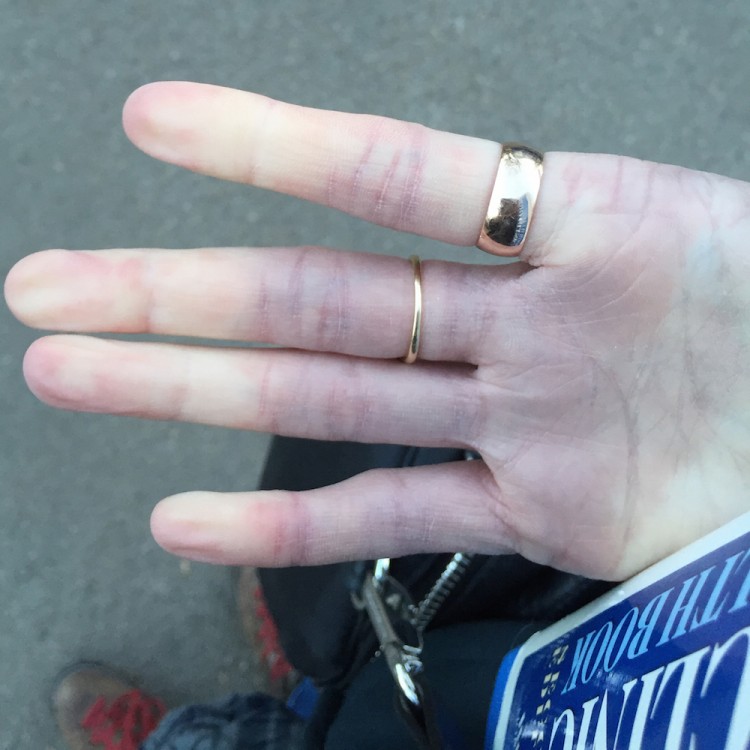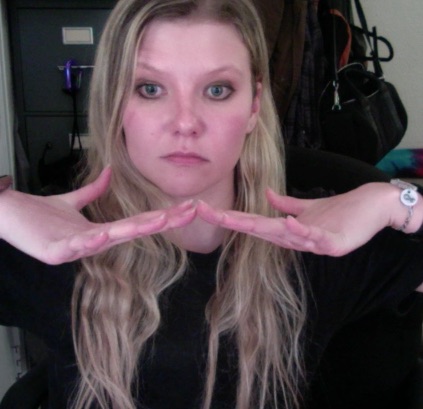When the media features Ehlers-Danlos syndrome (EDS), the focus is usually on those of us who dislocate multiple times a day, the chronic pain, those who can contort their bodies into extreme positions, and sometimes extremely stretchy skin. EDS, a genetic connective tissue disorder, is very under-recognized, even by the medical community, as most doctors, when they have heard of EDS, are only familiar with the well-emphasized symptoms. The lack of emphasis on the other signs means that those of us who present more subtly may struggle immensely in finding answers. Some of us, like me, even know our diagnoses going into our appointments and yet still struggle to find a doctor willing to learn and listen long enough to provide us with the “official” medical confirmation. Don’t get me wrong, we all struggle. From the obvious to the subtle, to live with EDS is to suffer, but even a small amount of recognition and a slight increase in awareness of our disease could go a long way towards improving all our lives.
• What is Ehlers-Danlos Syndrome?
• What Are Common Ehlers-Danlos Syndrome Symptoms?
EDS does have a very distinct clinical picture, but I don’t believe that’s the picture that’s well-known presently. The lack of awareness around EDS and its multi-systemic presentation needs to change.
The first time I complained of recurrent chest pain and pain in my arms and legs, I was 4. Doctors searched for the source of my chronic hip pain multiple times throughout my childhood, but they never found anything, and eventually they stopped trying. Eleven years ago, I began reporting chronic fatigue. I was provided a variety of seemingly disconnected diagnoses, but it never made sense to me that everything wasn’t all connected. Four years ago, frustrated with no doctor even making an attempt to help me, I started reading medical research myself. Having now found a lot of my answers, I’m still frustrated for every individual who has to go through similar experiences, including having to repeatedly face pervasive intolerances and a complete lack of understanding.
I’ve learned a lot during my journey, but the fact that’s become most apparent to me is that nothing is going to change if no one talks about their experiences. So, in honor of all the zebras out there, here are 23 things people may not know about my invisible disabilities.
1. The chronic conditions and diagnoses I live with are: Ehlers-Danlos syndrome, postural orthostatic tachycardia syndrome /dysautonomia, fibromyalgia, chronic fatigue syndrome, attention deficit disorder, asthma, cervicalgia, occipitoatlantal instability, loss of cervical lordosis, hyperhidrosis, orthostatic hypertension, hypertonic pelvic floor dysfunction, acrocyanosis, erythromelalgia, Raynaud’s syndrome, scoliosis, hypokyphosis (flattened thoracic spine), vertebral rotations, temporomandibular joint dysfunction, chronic intermittent paresthesias, chronic migraine, bilateral headaches and allergies. Every day’s a surprise symptom party…
2. The biggest adjustment I’ve had to make is: Knowing I can’t do everything.
3. Most people assume: Everything comes easy to me, and because I look fine, I am fine.
4. The hardest part about mornings are: Getting out of bed + showers. Heat and prolonged standing exacerbate and intensify my dysautonomia symptoms. Washing my hair even causes symptomatic problems, as holding my hands over my head reduces blood flow return to my heart, causing my heart to beat even faster, making what should be a simple act of showering into an exhausting and fatiguing experience, as my heart works overtime trying to pump blood to my body.
5. A gadget I couldn’t live without is: My computer (research is my superpower).

6. The hardest part about nights are: Knowing I’ll be having the *terrible morning, can’t get up, fatigue even worse than usual* feeling all over again.
7. Each day I take __ pills and vitamins: 11
8. Regarding alternative treatments: I am not opposed, but I want to do my own research.
9. Regarding working and career: I have too many interests for my own good. I want to do everything, yet – see #2.
10. People would be surprised to know: I’ve had never-ending fatigue every single day since 2005.
11. The hardest thing to accept about my new reality has been: Nothing. I’ve lived with this reality for a very long time — I simply didn’t yet have a “name” for it.
12. The commercials about my illness: Do not exist.

13. It was really hard to have to give up: Free time. Instead, I see multiple doctors, have over 10 patient portals, and spend my time organizing my medical records and shuttling information back and forth between doctors. I also spend time researching, because my symptoms still aren’t all accounted for, and no one else is going to do all the rare disease research reading for me.
14. A new hobby I have taken up since my diagnosis is: Interacting with other patients in online forums, and hopefully helping at least a few people by utilizing all the massive knowledge I’ve acquired during my four years of medical research while studying myself and finally figuring out my own diagnoses.
15. My illness has taught me: Two things. 1. To always trust myself, no matter what “authorities” or “experts” rudely dictate to me without ever really speaking to me and/or evaluating me, and 2. There’s enough pain in this world. Don’t make it worse for anyone.
16. Three things people say that get under my skin are: 1. “You don’t know your own symptoms,” and 2. “You don’t have that symptom.” I’m the only person who has lived my experiences, and only I have my symptoms. I spend far too much time photographing symptoms, because I know I’ll have to “prove” they happened. 3. “Ask a doctor.” Uncommon diagnoses and uncommon symptoms require uncommon thinking. Patients often can’t just ask any doctor their questions. Most doctors are not experienced in treating complex patients, and many refuse to treat us. Frequently, doctors will ignore a symptom, or tell us a symptom isn’t possible, rather than admitting not knowing. We have to do our own research, and many of us are very good at it. Please don’t de-value our knowledge or accuse us of “anxiety” simply because we ask questions on Internet forums. We may not have “a doctor” to ask.
17. But I love it when people: Listen with an open mind.

18. My favorite quote that gets me through tough times is: “Nothing strengthens authority as much as silence.” – Leonardo da Vinci
19. When someone is diagnosed I’d like to tell them: You’re not alone, always trust yourself, and don’t argue with people who are uninformed (this statement goes for encounters with uninformed doctors who refuse to listen, too). If they have a medical degree, they’ll likely also provide you with a lot of inaccurate documentation in your records that you’ll have a lot of difficulty getting corrected. There are good doctors out there, and there are doctors who are willing to admit they don’t know everything, doctors that want to learn, and doctors who will help you and be your support system. If you haven’t found one of the good ones yet, keep looking.
20. Something that has surprised me about living with an illness is: The massive lack of understanding that exists for invisible illnesses and disabilities, and the unnecessary pain individuals deal with that is forcibly imposed upon them, often daily, by others.
21. The nicest thing someone did for me when I wasn’t feeling well was: Listen, and try to understand.
22. I’m involved with Ehlers-Danlos Syndrome Awareness Month because: Awareness matters. To quote Jane Goodall, “What you do makes a difference, and you have to decide what kind of difference you want to make.” Individuals with EDS shouldn’t have to fight for their diagnoses, they shouldn’t have to educate geneticists who claim to be “experts,” and they shouldn’t have to constantly prove and re-prove the reality they’ve been dealt. We have a right to competent medical care and support, and we shouldn’t have to diagnose ourselves and then beg not only for our “official” diagnosis but also for simply a doctor to help improve our quality of life — in whatever way such improvement can be achieved.
23. The fact that you read this list makes me feel: That you’re likely one of the following: Someone looking for material to use against me (shame on you), really bored, know me personally and are being supportive by reading and learning far too much information about me, or you have similar experiences and can relate.
Follow this journey on Murray Meetze.

